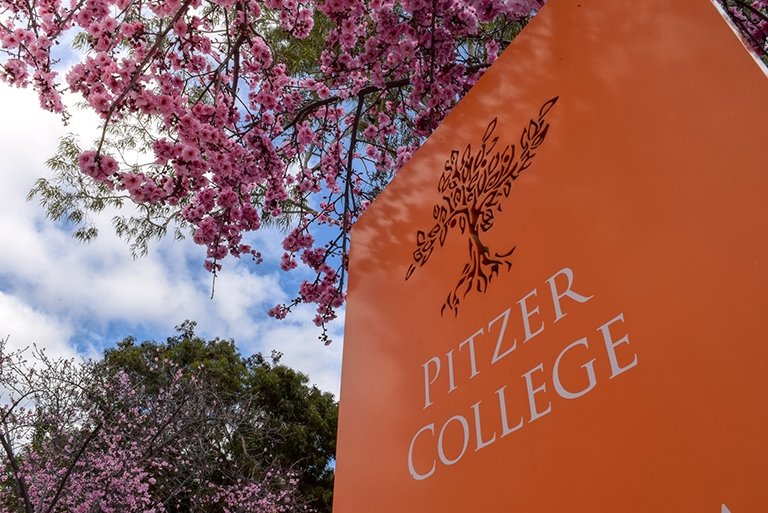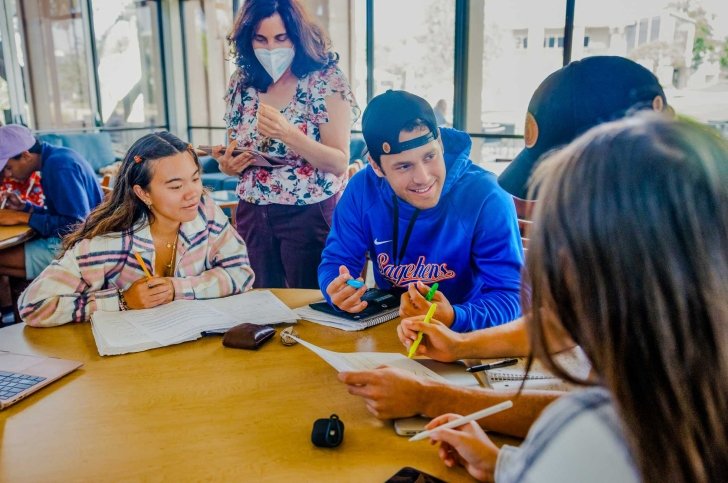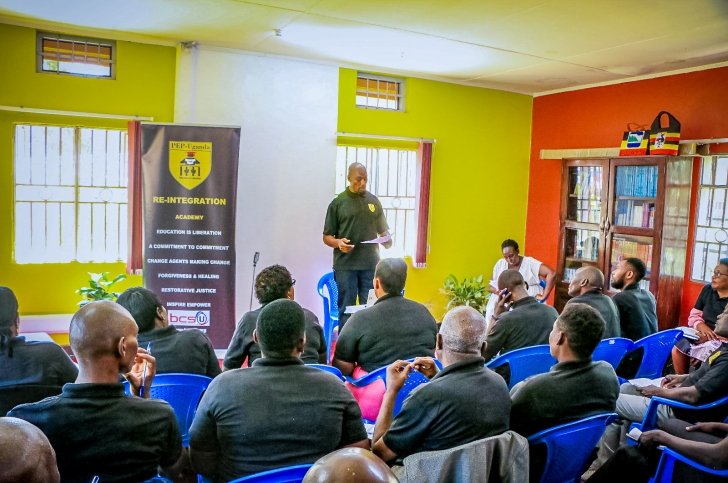Academic Spotlight: Pitzer’s Inside-Out Pathway-to-BA
Pitzer has become the first undergraduate institution in the US to transform Inside-Out curriculum into a program that leads to a BA for incarcerated learners.

“The Pitzer Inside-Out Pathway-to-BA is at the heart of Pitzer College’s educational objectives and core values, particularly social and racial justice, social responsibility, and the ethical implications of knowledge and action.”
Melvin L. Oliver, President, Pitzer College
Innovative Education During Incarceration
Damian Busby began taking college courses in prison in 2005. Fifteen years later, on December 10, 2020, he stood in front of a camera at the California Rehabilitation Center (CRC) and called the day “a triumph for all who are involved with the processes of education for the incarcerated.”
Busby was speaking as part of a virtual ceremony that marked the official launch of Pitzer College’s Inside-Out Pathway-to-BA program. Working together with the CRC, a medium-security state prison in Norco, CA, the new Pitzer program does precisely what its name implies: uses Inside-Out curriculum to create a pathway to a Bachelor of Arts degree for incarcerated learners.
Watch the launch of Pitzer’s Inside-Out Pathway-to-BA. Video includes the presentation of the College’s acceptance letters and the signing of a memorandum of understanding between Pitzer, the California Rehabilitation Center, and the California Department of Corrections and Rehabilitation.
“My cohort and I have been blessed with the outstanding opportunity to obtain what I thought was impossible—a bachelor’s degree behind bars,” said Busby, one of eight students in the program’s inaugural cohort.
In Inside-Out classes, originally developed at Temple University, “inside” incarcerated students and “outside” college students take the same courses in the same classrooms from the same professors and are all held to the same exacting standards. Pitzer, one of five top-ranked undergraduate colleges in Claremont, CA, (known as the 5Cs), initiated these classes with outside students and professors from the 5Cs and inside students from the CRC in 2014. Now, Pitzer has become the first undergraduate institution in the US to transform Inside-Out curriculum into a program that leads to a BA for incarcerated learners.
Part of the intercollegiate Justice Education Initiative (JEI) at the Claremont Colleges, Pitzer’s Pathway-to-BA program was developed in partnership with both the CRC and Norco College, a local community college.
Learn more about the Justice Education Initiative at the Claremont Colleges
Courses span the spectrum from sociology to chemistry and are free for inside learners. Prior to the pandemic, students and professors from the 5Cs traveled 20-plus miles to Norco to take or teach courses inside a prison classroom. After the Claremont Colleges closed their campuses and education went online in March 2020, Pitzer and the JEI collaborated with the CRC to pioneer virtual Inside-Out classes.
Professor of Political Studies Nigel Boyle, who heads the program with Tyee Griffith, the founding manager of JEI, calls the Inside-Out courses “the secret sauce in our BA program.”
Busby calls them “another impossible wish brought to life.”
“We can interact with the professors and the students,” he said, “and in doing so, we are given a sense of self-worth and humanity.”
Pitzer’s Inside-Out approach creates a powerful learning environment that extends well beyond academics. Outside students take the same courses as they would on campus—while also learning about mass incarceration, the realities of life behind bars, and the lives of their inside peers.
One outside Pitzer student summed up the sentiment of many participants when Inside Higher Ed asked her about her experience: “The word that comes up is ‘transformative,’” she said.
Read the Inside Higher Ed article “B.A. Program for Students, Incarcerated and Not”
Reggie Bullock, who is part of the inaugural cohort of inside students, echoed that word during the December launch ceremony: “Every single day that I come to a class has been transformative in some way.”
Freddy Cisneros, another member of the inaugural cohort, called the Inside-Out experience both immersive and inclusive.
“We all get to share a classroom,” he said. “This is special because it allows for academic discussion that takes into account the extensive life experiences of inside students and unites them with the fresh point of view from the outside students. For a moment, two worlds that seem so far apart are joined to grow and learn from one another.”
Drawing together seemingly disparate worlds—creating proximity—was one of the animating ideas behind the Inside-Out model. Lori Pompa, who founded Temple University’s Inside-Out Prison Exchange Program, spoke during the launch ceremony and recalled an inside student telling her that the walls of the prison weren’t just there just to keep him in, “but to keep you out.”
A BA program that chips away at those walls is unique.
Before the launch of the BA program, individuals who are incarcerated at the CRC could earn associate degrees through correspondence courses or through Norco College’s Prison Education Program. Busby had earned six associate degrees but couldn’t go any further in higher ed from inside prison. He didn’t have a pathway to a BA.
Now he does. Today, incarcerated learners at the CRC who want to pursue their BA can apply to Pitzer via the same application process as all other prospective students. If they are accepted, any credits they already have at Norco College will transfer into the Pathway-to-BA program.
Pompa said the program truly creates a pathway for the students and a blueprint for prison educators around the country.
“What you all have developed here at the Claremont Colleges is impressive, creative, and frankly, inspirational,” Pompa said. “It will serve as a model for others throughout our network to potentially build degree-granting programs utilizing the Inside-Out pedagogy.”
Learning from the Past, Rewriting the Future
Pitzer’s program draws on prison education models created by other institutions as well as a long history of related work at the Claremont Colleges.
At the December ceremony, Tyee Griffith of JEI said, “We are standing on the shoulders of pioneers like (Pitzer professor) Laura Harris and others who have been doing work in carceral facilities for decades.”
“For nearly 25 years, dedicated students, staff, and faculty at the Claremont Colleges have been expanding educational opportunities to students in carceral settings,” she said. “Thanks to the generous donations from The Andrew W. Mellon Foundation and the Bernard & Audre Rapoport Foundation, we have been able to expand justice education at the Claremont Colleges.”
Pitzer also drew lessons from Bard College’s Bard Prison Initiative (BPI). While BPI doesn’t use Inside-Out curriculum, its rigorous, full-time degree program was an inspiration for Pitzer’s Pathway-to-BA model.
The Pitzer College community is looking for more ways to integrate inside students into campus life, even if they can’t set foot on campus before they graduate.
In May 2021, Pitzer’s Student Senate amended its constitution to create a special representative position for currently and formerly incarcerated students. The legislation sponsors wrote that the lived experiences and needs of individuals who are, or have been, incarcerated merits “their representation, inclusion, and empowerment with all aspects of Pitzer student life.” The position is a voting member of the Student Senate and will vote alongside “outside” Pitzer students on Senate business.
Despite its modest start-up size, Pitzer’s Pathway-to-BA program has bold ambitions. Currently, all inside students earn a BA in organizational studies, a popular, interdisciplinary major at Pitzer. In coming years, the program hopes not only to grow the roster of possible majors but also to expand to other correctional institutions in the area, offering more choices to more incarcerated individuals.
“We want this program to be sustainable—to start small, let it grow, and make it a magnet to turn prisons into education facilities, swords into ploughshares,” Boyle said.
In California alone, 100,000 individuals are incarcerated—and the vast majority will one day win release. A RAND Corporation study found that those who participate in correctional education programs have a 43 percent lower recidivism rate than those who don’t. This backs up decades of research that shows that recidivism rates are lower—and wages higher—for those who pursue education while incarcerated.
Shannon Swain, superintendent of correctional education at the California Department of Corrections and Rehabilitation, attested to the benefits of college courses in prison. “We all know that education is something that can never be taken away once somebody has it,” she said.
Cynthia Tampkins, CRC’s warden who worked with Pitzer and the JEI for years to develop the Inside-Out BA program before retiring in December 2020, described earning a degree in existential as well as educational terms.
“Our BA program gives our men in blue a new start on life,” Tampkins said.
The program is both a new start and a re-start, according to inside student Yusef Pierce.
“For me, what being a Pitzer student means is opportunities: both new opportunities I had never imagined for myself as well as recovered opportunities that I had thought were long lost,” Pierce said.
During the virtual launch ceremony in December 2020, he said that years ago, his brother got a job at the Claremont Colleges as a custodian. His mother was so excited, Pierce recalled, so full of hope that his brother would enroll in classes and ultimately earn his college degree. The job didn’t last, and five years later, his brother was shot and killed.
“My mother took it very hard,” Pierce said. “All she wanted was for my brother to have an opportunity to graduate from college.”
On May 15, 2021, Pierce became the first Pitzer student to graduate through the Pathway-to-BA program when he earned his BA in Organizational Studies. Selected to speak during the College’s virtual commencement ceremony, he gave his address from inside the CRC.
Listen to NPR’s Morning Edition story on Pierce, “Student Makes the Most of Time Behind Bars, Finishes College with Honors.”
“I want to dedicate this degree to my mom and all the other moms out there,” he said, after reading a letter she wrote him in 2010 that included the poem Invictus and its lines, “I am the master of my fate, I am the captain of my soul.”
Pitzer’s Inside-Out Pathway-to-BA program is fundamentally rooted in the idea that higher education changes lives and rewrites the future. Speaking at the launch event in December, Pitzer President Melvin L. Oliver described education as a journey that creates opportunities for individuals, for families, for generations.
“Congratulations on your admission to Pitzer College,” he said to Pitzer’s first Inside-Out Pathway-to-BA students. “I welcome you on an incredible journey of transformative education, one taken by the likes of Frederick Douglass in the midst of slavery, and Malcolm X from the confines of prison and urban racism. This is a transformation that will not only impact your lives, it will set an example and leave a legacy for others who follow.”
Videos
- Combating the Prison Industrial Complex: Lessons from the Frontlines, March 2, 2021
- Discussion of College Behind Bars, with Lynn Novick, Jule Hall, Nigel Boyle, Michael Griggs ’21 and Leeann Nabors ’21, February 13, 2021
- Launch of Pitzer Inside-Out Pathway-to-BA for Incarcerated Students, December 10, 2020
News Information
Published
Organization
- Justice Education Center at the Claremont Colleges


